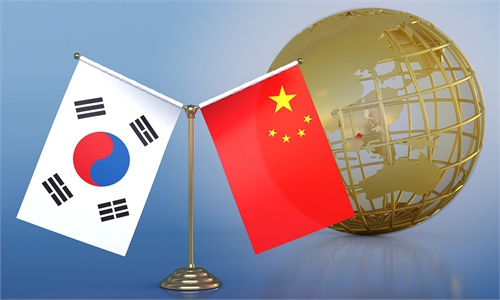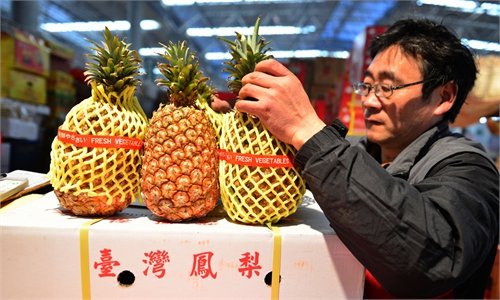Continuing decline in cross-Straits trade caused by DPP's policy of following US-led decoupling hurts interests of residents

Illustration: Xia Qing/GT
Cross-Taiwan Straits trade has continued shrinking in recent months due to the overall economic environment as well as the Democratic Progressive Party (DPP) authorities' policies of following the US-led, ill-intentioned containment against the Chinese mainland, which has seriously disrupted supply chains. Officials and experts warned that a decline in cross-Straits trade will weigh on the supply and demand balance in the island, leading to higher prices and eventually damaging the interests of Taiwan residents.
In response to statistics showing that trade between the mainland and Taiwan decreased 26.5 percent in the first quarter on the year-on-year basis, Zhu Fenglian, spokesperson of the Taiwan Affairs Office of the State Council, told a press conference on Wednesday that out of the political nature of "relying on the US to seek 'independence,'" the DPP authorities are willing to sacrifice Taiwan's economic prospects and destroy the jobs of people in the Taiwan island.
"On the one hand, they restrict and suppress cross-Straits economic and trade exchanges and cooperation in various fields, and set up many obstacles for normal cross-Straits economic, trade and personnel exchanges. On the other hand, they coordinated with some anti-China forces in the US-led West and handed over the island's core advantageous industries, leading the Taiwan island to lose a large number of professional workers and economic wealth," Zhu said.
These actions resulted in slow economic growth and reduced exports, while rising prices and a widening gap between the rich and the poor became more prominent, which seriously damaged the interests of Taiwan compatriots, the spokesperson said.
With the US increasing its interference in the Taiwan question and continuing to play the "Taiwan card" to contain the mainland, the island recorded a severe economic situation in the first quarter of 2023.
Local finance authorities revealed that the island's exports fell 19.2 percent year-on-year in the first quarter to the lowest level in 14 years, according to media reports.
"While many economies in East Asia have suffered shrinking trade since the end of 2022, the island recorded sluggish trade due to some geopolitical factors including the US-led decoupling drive and its containment against the mainland," Wang Jianmin, a senior cross-Straits expert at Minnan Normal University in East China's Fujian Province, told the Global Times on Wednesday.
Also, amid deteriorating cross-Straits relations, the DPP authorities imposed obstacles in cross-Straits exchanges, accelerating the trade and investment decline, Wang said.
Some local media in the island noted earlier that sluggish trade between the island and the mainland should not be ignored, given that cross-Straits trade accounts for a large part of the island's exports.
Since the 1990s, trade and investment had been growing between the mainland and Taiwan.
The DPP authorities have been seeking to reduce economic dependence on the mainland and follow the US in "decoupling from the mainland," which also explained the continuing decline in cross-Straits trade, a Beijing-based expert on the Taiwan question who preferred not to be named, told the Global Times on Wednesday.
"They also spent much more by importing products from the US or Japan rather than from the mainland to reduce such dependence, which directly affects the livelihoods of local residents," he said.
For instance, the island has been gripped by a shortage of eggs for months, causing their price to skyrocket, but the DPP authorities refused to import eggs from the mainland and instead turned to countries such as Australia and Japan, the expert noted.
On April 12, the Ministry of Commerce launched a trade barriers investigation into the island's trade restrictions on more than 2,400 imports from the Chinese mainland. The Taiwan authorities have long adopted unilateral restrictions on the import of products from the mainland spanning agricultural goods, textiles and mineral products, which have damaged the interests of related industries and enterprises in the mainland.
"Cross-Straits trade enables the island to enjoy a trade surplus of over $100 billion every year, and the trade decline with the mainland will surely lead to rising costs, decreasing revenues while hurting the interests of local residents," the Beijing-based expert said.
Cross-Straits economic and trade cooperation is the driving force and opportunity for Taiwan's economic development, said Zhu, the spokesperson.
Only by deepening economic exchanges and cooperation with the mainland can the island achieve better economic development and benefits for its people amid a world full of uncertainties, she said.



